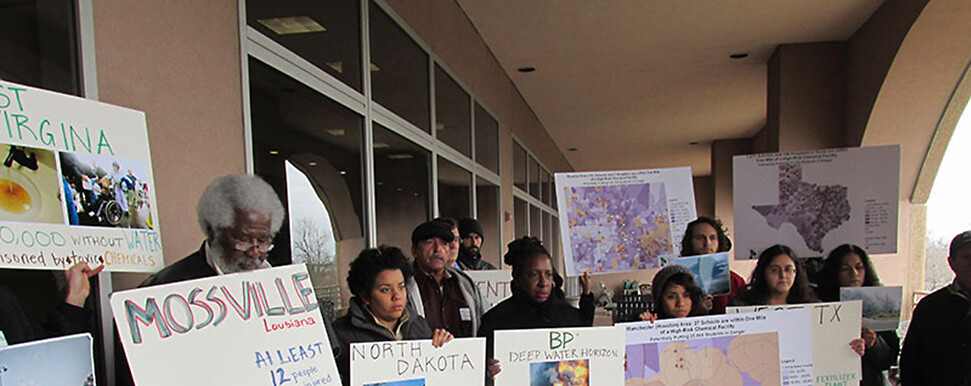
Media
June 13, 2019Release: Parents and Health Experts Praise Dollar Tree for Toxic Chemical Progress, Criticize Lack of Transparency and Junk Food 'Zones'
Activists Purchased Shares to Attend Dollar Tree Annual Shareholder Meeting and Voice Concerns Directly to Executives
Contact: Eric Whalen, (971) 998-8786, EricWhalen@ComingCleanInc.org
Chesapeake, VA — Today, customers and parents attended the annual shareholder meeting of Dollar Tree, Inc. and urged executives to tell the public what progress they are making toward their commitment to remove 17 highly-hazardous chemicals from products it sells. They also asked executives to move toward selling fresh fruit and vegetables in its 'snack zone' concept rather than just junk food. Dollar Tree executives did not announce new policies to protect customers, but said they are listening to shareholder concerns and trying to do the right thing. They also said they plan to issue another sustainability report before the end of this year which will summarize the company's progress on efforts to address toxic chemicals in products.
The activists attending Dollar Tree's annual shareholder meeting were an all-woman group of health experts, customers, and parents concerned about chronic health conditions and learning and developmental disabilities associated with toxic chemical exposure from consumer goods. After purchasing shares to gain access to the meeting, these customers, parents, and experts voiced their concerns directly to executives and some of the corporation's top shareholders.
"We deserve business partners in our communities that at least offer the opportunity to make healthy choices," said Andrea Juarez, spokesperson for the Campaign for Healthier Solutions. "In our communities, many of which face disproportionate chemical exposures and suffer poor health, we need Dollar Tree to offer nontoxic products and healthy foods—so they aren't piling on to the problems we already have."
Chemicals linked to cancers, asthma, endocrine disruption, and learning and developmental disabilities have been found in children's products, consumer goods, and preserved foods [1, 2, 3] sold by Dollar Tree, Inc. owned stores. Hazardous chemical exposure linked to at least a quarter of all learning and developmental disabilities.
"Product testing results which have found lead and phthalates in children's products are deeply troubling," said Tracy Gregoire, who works with the Learning Disabilities Association of America. "It's unacceptable to sell products to homes with children or pregnant women that contain toxic chemicals linked to lower IQ, ADHD, and learning and developmental disabilities. Dollar Tree should continue to improve its commitment to our children's health and safety."
Dollar Tree executives have progressively responded to pressure over hazardous chemicals in products it sells by taking incremental steps toward improved safety measures for customers, first with an announcement to eliminate a set of toxic chemicals from products it sells by 2020. More recently, Dollar Tree elected to join the Chemical Footprint Project, which works to help brands understand market risks stemming from toxic chemical use in products and the incentive for safer chemical and product substitutes. While falling short of a complete, transparent, and protective corporate chemicals policy, public health and environmental justice advocates celebrated Dollar Tree's decision, which signals it may be joining some of the nation's most active retailers when it comes to protecting customers from chemical hazards.
"We appreciate Dollar Tree's recent progress toward protecting customer's health, but there's still a lot that needs to be done," said Deyadira Arellano, Organizer with Texas Environmental Justice Advocacy Services (t.e.j.a.s.). "One of the first things Dollar Tree should do to strengthen its commitment to our health and safety is to publicly disclose all ingredients in its house brand, Greenbrier International products."
Dollar Tree, Inc. operates over 15,000 stores, including recently acquired Family Dollar brand stores, which makes it one of the nation's largest discount retailers. Its size means that any steps to reduce toxic chemical use will have far-reaching impacts on public health and the environment—from the manufacture of product constituents to product disposal.
"Dollar Tree executives need to consider toxic chemical exposures and their impact on our families a top priority," said Pam Nixon, who works with People Concerned About Chemical Safety. “Communities of color and low-income people already face higher levels of environmental pollution and its resulting health impacts: this is a justice issue."
Hazardous chemicals in food and products sold by Dollar Tree are of particular concern to people of color and low-income communities as they disproportionately rely on these stores for nutrition and household goods. Also, studies have shown people of color and the poor are often already exposed to chemical hazards at higher levels. Although the dollar store market sector still lags far behind retailers who cater to more affluent customers, there are signs that dollar stores are moving with increasing speed to enact publicly-accountable policies to protect their customers and workers from hazardous chemicals.
"We want Dollar Tree stores to be part of our community—not take advantage of our community," said Elizabeth Martinez, who works with Lideres Campesinas. “Every child deserves safe and healthy food, and our communities deserve at least the opportunity to buy fresh fruits and vegetables; it's the least any business partner who cares about our health should do."
Following the shareholder meeting, these members of the Campaign for Healthier Solutions said they will continue educating shoppers about hazardous chemicals in Dollar Tree's products. They said they plan to keep pushing the chain's executives until the company enacts a publicly accountable chemicals management policy which proactively discovers chemical hazards and works to replace the ingredient—or the product—with safer alternatives. The activists aren't calling for a boycott, but rather, they want Dollar Tree to make a more positive impact on the health and well-being of their customers, workers, and disproportionately impacted communities.
###
Photos and videos are available upon request.
The Campaign for Healthier Solutions is a diverse coalition of over 100 environmental justice, medical, public health, community, and women's organizations working with discount retailers toward responsible hazardous chemical policies and better corporate citizenship. Learn more at NontoxicDollarStores.org.
